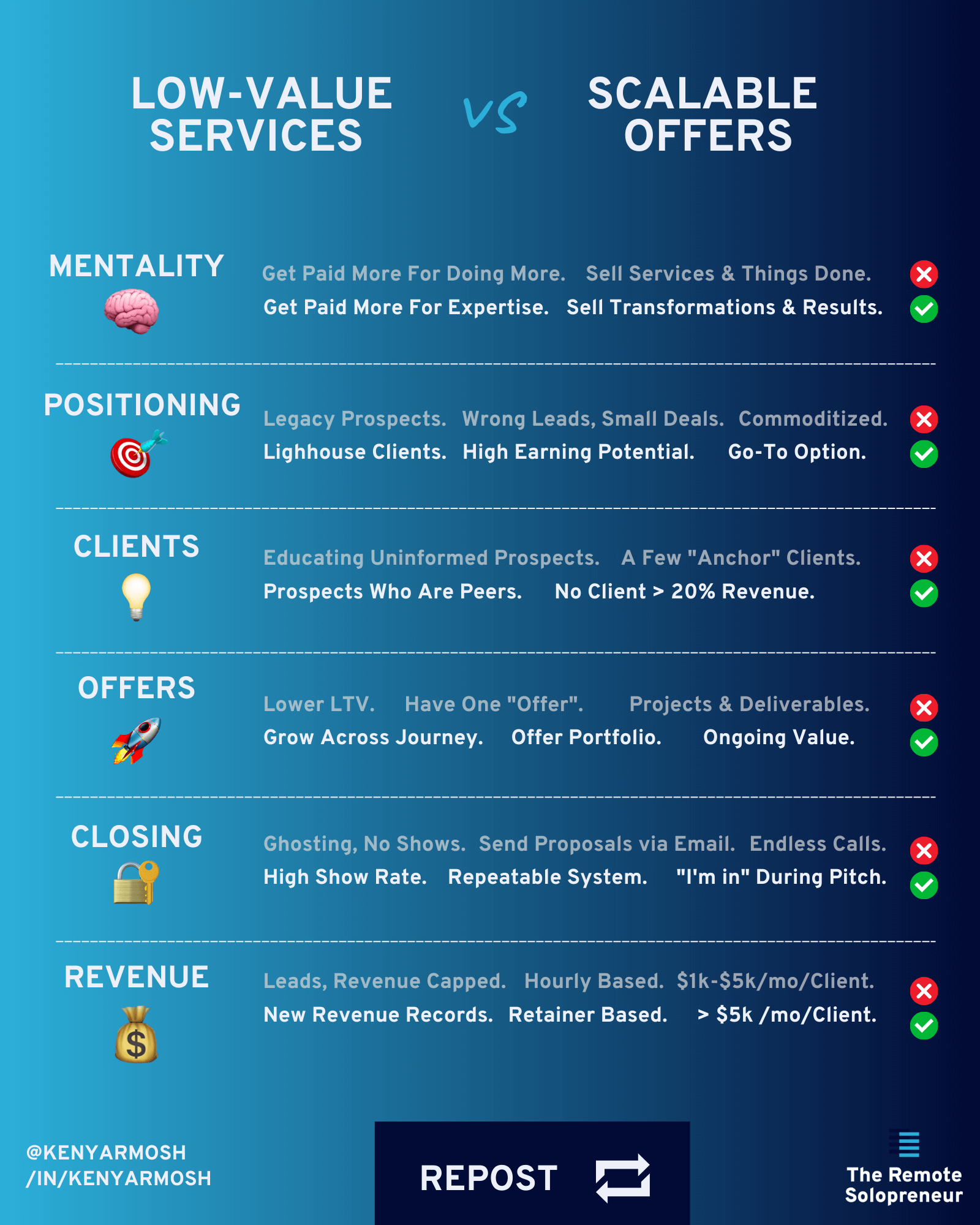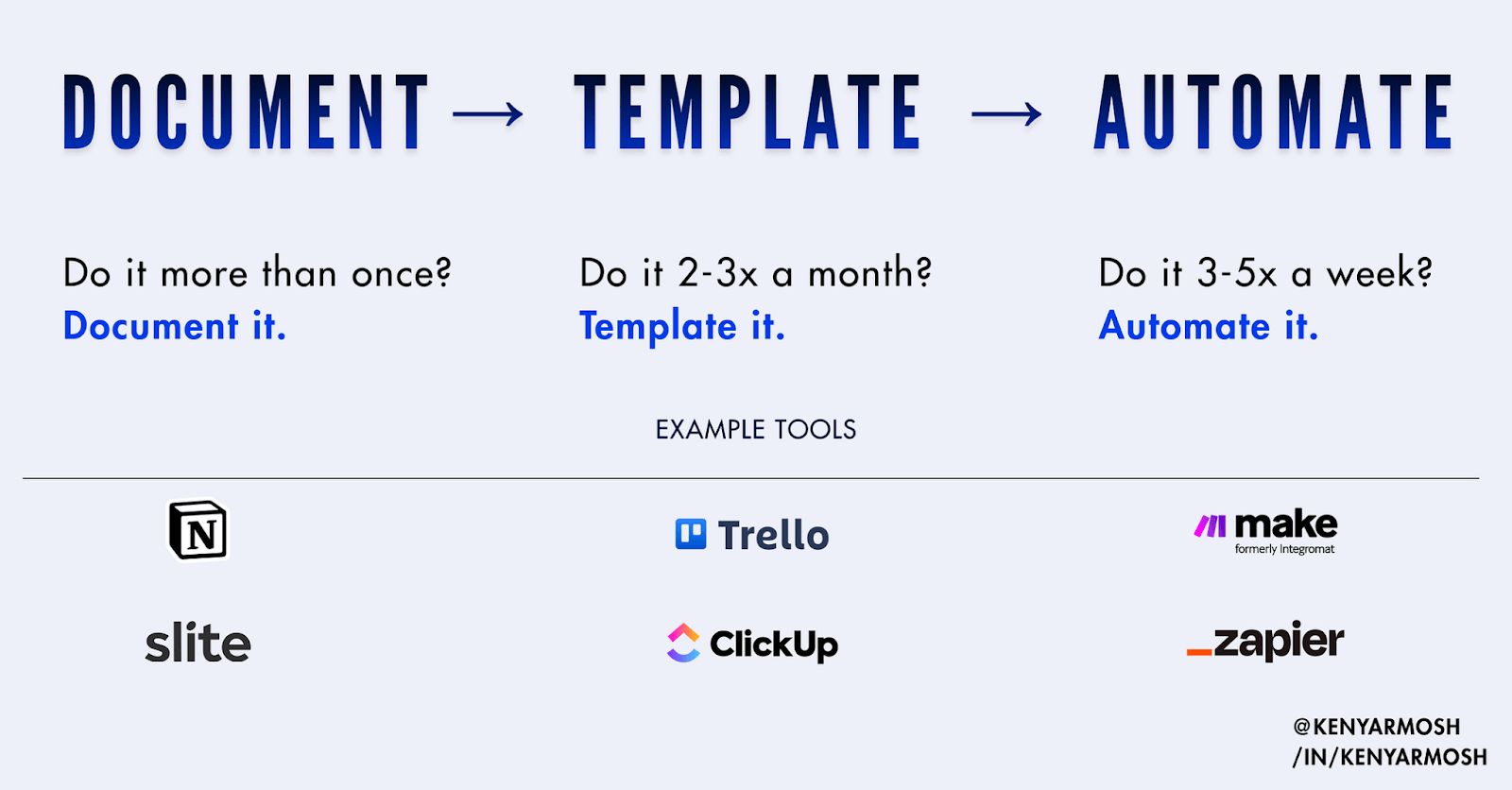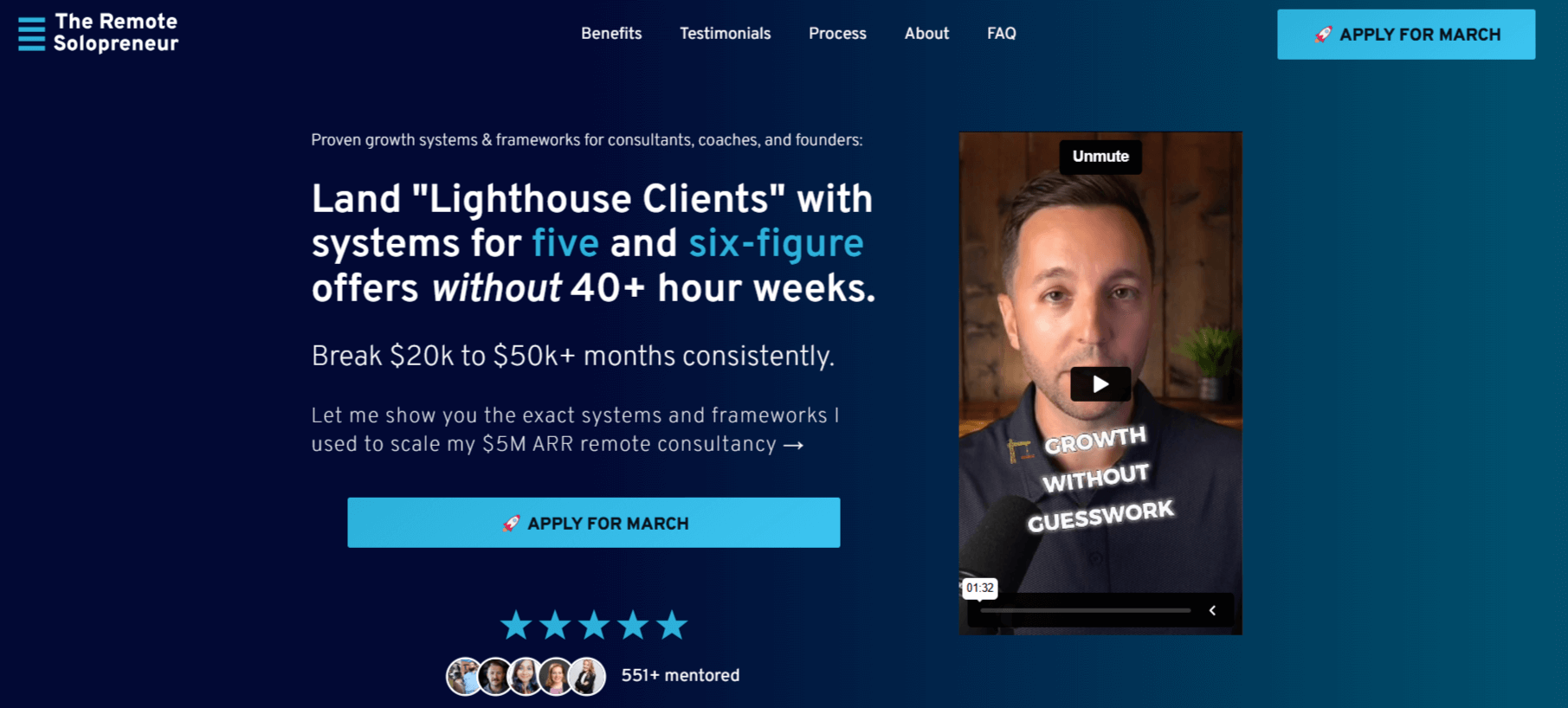🚀 TL;DR
- Solopreneur success is less about hustling endlessly and more about building repeatable systems, clarity of focus, and sustainable growth.
- Start with solving urgent, high-value problems (not “nice-to-haves”) and focus first on active income (client work) before chasing passive or scalable offers.
- Identify and double down on “Lighthouse Clients” — the types of clients who are willing to pay premium for what you do best — and package your services to scale without crushing your time.
- Document, template, and automate your processes (sales, delivery, marketing) to reduce friction and expand your capacity.
- Don’t go it alone — join communities, cowork with peers, and find mentors (or “uncoaches”) who deeply understand the solo path.
There are dozens of myths around what it takes to become a successful solopreneur.
I’ve been a remote solopreneur for two decades. And I’ve built multiple seven-figure businesses without massive teams, venture capital, or burnout.
What I’ve discovered over nearly two decades might surprise you: success as a one-person business doesn’t come from chasing trending strategies or working 80-hour weeks.
The most successful solopreneurs build sustainable systems, focus on high-value work, and connect with others who understand their unique journey.
In this guide, I’ll share the 14 tips for solopreneurs who want to build something meaningful without sacrificing their health (or values) along the way.
1. Solve burning problems in your market
Most solopreneurs struggle because they’re selling services nobody urgently needs.
The market is crowded with generalists offering “nice-to-have” solutions. But true opportunity exists in solving the problems that keep your potential clients up at night.
When I started my first remote business, I didn’t focus on what I thought was cool or cutting-edge. I focused entirely on what my target market desperately needed solved.
This approach requires deep market research beyond surface-level understanding. You need to talk with potential clients about their actual challenges, not just what they say they want.
Pay attention to the language they use. Notice the emotions behind their frustrations. These insights will guide you toward the most valuable problems to solve. As a result, you’ll be able to target Lighthouse Clients with specific needs who are willing to pay a premium.
Remember: When you solve genuine problems, marketing becomes easier. Sales conversations flow naturally. And your client results speak for themselves.
2. Maximize your active income first
Many new solopreneurs get distracted by passive income dreams before establishing a solid foundation.
Courses, digital products, and affiliate marketing can be valuable—but not as your primary focus when starting.
The most successful path I’ve seen (and personally followed) begins with maximizing your active income through direct client work. This approach provides immediate cash flow while you build expertise and systems.
Focus first on high-value services where you have deep expertise. Most of the income-generating gurus started with service businesses, not digital products.
Your active income funds your business growth. It allows you to invest in better tools, education, and, eventually, more scalable revenue streams.
This strategy also connects you directly with your market. Each client engagement provides insights into pain points, needs, and potential product opportunities you wouldn’t discover otherwise.
Each client win builds momentum and credibility that makes subsequent growth easier.
You should consider expanding into more leveraged offers only after establishing a stable active income. The foundation matters more than most realize.
3. Close repeatable premium “Lighthouse Clients”
Generic advice tells you to create customer personas. I’ve found a different approach works better for solopreneurs.
Instead of imagining fictional ideal customers, focus on finding what I call “Lighthouse Clients”—premium clients who validate your highest-value work and attract similar opportunities.
These aren’t just any clients. They represent the specific subset of your market willing to pay premium rates for specialized expertise.
When I scaled my business past seven figures, I did it by identifying patterns among my most profitable and enjoyable client relationships. I then deliberately sought more of those specific types of clients.
Document everything about these relationships: how you found them, what language resonated, which problems you solved, and the outcomes you delivered.
This creates a repeatable system for attracting similar high-value clients rather than taking whatever work comes your way.
You’re the moat. Don’t build a business that forgets that.
Ultimately, your ability to attract and serve premium clients is your competitive advantage as a solopreneur.
4. Create scalable service offers
Many solopreneurs trap themselves by selling their time directly. The path to growth requires creating more scalable service offers.
This doesn’t mean abandoning services for products. It means structuring your services in ways that increase your effective hourly rate and allow for growth without working more hours.
The most profitable solopreneurs develop clear, packaged offers with defined deliverables, timelines, and outcomes. They avoid the endless scope creep of hourly arrangements.
Your scalable offers should solve specific problems with clear outcomes. They should be deliverable through systems you can eventually delegate or automate parts of.

Remember that clients pay for outcomes, not hours. When your expertise solves meaningful problems efficiently, charging premium rates becomes natural and appropriate. And every business decision relies on the offer you finally create.
5. Focus on the transformation you provide
Clients don’t buy services—they buy transformations. Yet most solopreneurs market features instead of outcomes.
The transformation your work creates is your true product. It’s the difference between where clients are now and where they want to be.
When I mentor solopreneurs, I push them to articulate transformations in concrete terms, such as:
- Increased revenue
- Reduced costs
- Saved time
- Eliminated stress
- Enhanced reputation
- Improved capabilities
Consider what your clients truly gain from working with you. A web designer doesn’t just deliver a website—they provide a professional online presence that attracts more qualified leads.
Your marketing should focus on these transformations. Document client results meticulously. Share specific outcomes rather than vague promises.
The inbox is your product lab. Listen more than you launch. Pay attention to how clients describe the value they received, often in ways you hadn’t considered. It justifies premium pricing based on value rather than time.
6. Constantly test your value props
Your initial assumptions about what clients value most will almost certainly be wrong.
The most successful solopreneurs regularly test and refine their value propositions based on market feedback.
When I grew my consulting practice, I conducted regular client interviews to understand which aspects of my work they valued most. The answers constantly surprised me.
Create simple A/B tests for your messaging on your website, sales conversations, and proposals. Note which frameworks and approaches generate the strongest responses.
Pay special attention to the language clients use when describing their challenges and desired outcomes. Their words often make better marketing copy than anything you could invent.
Even after years in business, I regularly revisit and refine my value propositions. Markets evolve, client needs shift, and your unique skills develop—your messaging should reflect these changes.
7. Build scale into your business through systems
Most solopreneurs hit an income ceiling because they’re the bottleneck in every process. It’s because they have complete control over the work but also want to do everything on their own.
Building systems is how you break through this ceiling without hiring employees.
My DTA framework—Document, Template, Automate—helps solopreneurs systematize their work. First, document your recurring processes in detail. Next, create templates for common deliverables. And, automate all the repetitive tasks.

For example, I documented my client onboarding process, created templates for welcome materials, and automated the scheduling and delivery. This saved hours per client while improving their experience.
Systems free your creative energy for high-value work. They ensure consistent quality even when you’re handling multiple clients simultaneously. Your systems should make your work more sustainable rather than creating more burdens.
Good systems also make your business more valuable.
8. Always invest back into the business
When new income flows in, resist the temptation to withdraw it as personal compensation. Instead, allocate a percentage specifically for business development.
I’ve seen too many talented professionals plateau because they failed to invest in better tools, advanced training, or expert help in areas outside their core strengths.
My business growth accelerated when I established a strict reinvestment policy. I aggressively—and consistentlyI reinvest profits toward capabilities that increase my future capacity.
For example, you could invest in:
- Premium tools that save time
- Specialized education that expands your expertise
- Fractional help with tasks outside your zone of genius
Investing in yourself counts as a business investment. If something helps you build capacity and more value for clients, don’t think twice.
9. Don’t measure growth only in terms of revenue
Revenue is just one dimension of business growth. The most fulfilled solopreneurs optimize for multiple success metrics.
Track improvements in your:
- Effective hourly rate
- Project completion time
- Client satisfaction scores
- Personal well-being
The distinction between revenue and profit matters. Many solopreneurs chase higher revenue while neglecting profitability, only to work harder for little gain.
Consider tracking your “freedom ratio”—the percentage of your time spent on work you genuinely enjoy versus administrative or draining tasks. Improving this ratio should be a priority.
Remember: Sustainable business > scalable business. If it burns you out, it’s not worth it.
The ultimate goal is to build a business that serves your life, rather than consuming it.
10. Celebrate small wins
As solopreneurs, we’re often too hard on ourselves. We tend to brush past actual wins, but don’t forget that one mistake we made years ago.
That’s why I recommend documenting and celebrating small wins to build momentum. It’s not vanity—it’s mental fuel for the long game.
I maintain a “wins journal” where I record achievements. I even have a #Wins section in my community to help clients celebrate all their achievements.

Examples of wins worth celebrating include:
- Signing new clients
- Completing difficult projects
- Implementing new systems
- Receiving positive testimonials
- Saying “no” to demanding clients
- Wading through personal challenges
You have to be your own hype squad. No one else will track or acknowledge your incremental progress—it’s your responsibility.
Celebration builds resilience. Recognizing patterns of success creates confidence in your ability to overcome future obstacles.
The most psychologically healthy solopreneurs I know make celebration a non-negotiable business practice rather than an occasional afterthought.
11. Network relentlessly and find like-minded individuals
Most solopreneurs focus exclusively on client acquisition. They tend to neglect relationships with peers that provide support, referrals, and collaborative opportunities.
When I built my first seven-figure business, my network of fellow experts proved more valuable than any marketing strategy. They provided emotional support, technical advice, and access to opportunities I couldn’t have found alone.

Look for peers who complement your skills rather than compete directly. These relationships often evolve into strategic partnerships or collaborative projects that benefit both parties.
“Solopreneur” doesn’t mean solo energy. The right connections transform the entire experience of running a one-person business.
Make relationship-building a scheduled activity in your business. Set aside dedicated time each month for meaningful outreach.
12. Cowork virtually or in person
You can work with other solopreneurs or business owners in formal coworking spaces, casual coffee shop sessions, or virtual coworking platforms. The format matters less than the shared focus and accountability.
Many solopreneurs schedule regular virtual coworking sessions with select peers. They work independently on their projects while connected via video. They also take breaks for brief discussions and mutual support.
These sessions create gentle accountability while combating the procrastination that often creeps in when working alone. They also provide natural opportunities for quick feedback or brainstorming.
Physical coworking spaces offer similar benefits, plus the advantage of complete separation between work and home environments. This boundary helps many solopreneurs maintain clearer focus.
13. Join communities online or IRL
Dedicated communities provide ongoing support beyond what individual relationships or occasional meetups can offer.
These communities might be industry-specific forums, paid membership groups, social media circles, or local business organizations. Each offers different benefits for solopreneurs at various stages.
I created my own remote solopreneur community called The Club, specifically for solopreneurs who felt existing groups didn’t address their unique challenges. This has become the go-to resource for hundreds of independent professionals seeking tactical advice and emotional support.

Online communities offer accessibility and diversity. You can connect with peers worldwide regardless of location, accessing perspectives and expertise unavailable locally.
In-person communities provide deeper connections and spontaneous interaction. Check out your local business groups, industry meetups, and regional conferences. If you can learn a specific skill or access a pool of Lighthouse Clients, it’s worth the time and money investment.
14. Seek mentorship or (un)coaches
Unlike traditional business coaching, solopreneur mentorship should come from someone who has built a business similar to yours. Generic business advice rarely addresses the unique challenges of one-person operations.
I refer to my approach as “Uncoaching” because it focuses on unlearning many bad business habits and building leverage through systems and clarity. See how a marketing consultant got "uncoached" here:
The right mentor helps you identify blind spots, challenge limiting assumptions, and develop strategies tailored to your business model and professional goals.
Mentorship can be formal or informal. You can invest in paid coaching relationships for structured accountability. Or spend time on informal mentorship through experienced peers when you get flexible guidance based on mutual respect.
Embrace your unique solopreneur journey
There’s no universal template for building a successful business as a solopreneur.
Many solopreneurs struggle because they follow advice designed for completely different business models. But your competitive advantage lies in your ability to stay nimble, focused, and true to your expertise.
The most successful solopreneurs I know have built businesses that reflect their values and play to their strengths. They’ve created systems that amplify their impact without sacrificing their quality of life.
Remember that sustainability trumps scalability every time. Build something you can maintain for years rather than chasing growth that leads to burnout.
Now, take action. Select one or two principles from this guide that resonate most strongly with your current situation. And implement them this week.
Here’s to your success as a solopreneur—on your terms, built your way.

